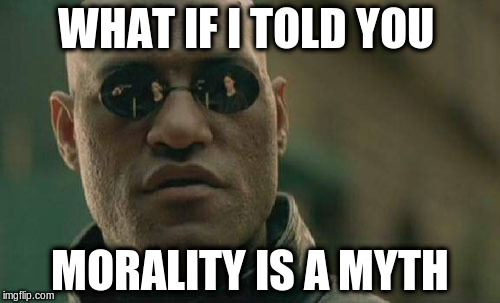Morality Isn't Relative: Morality's a Myth

What if I told you that all the controversy surrounding morals and morality was absolute bullshit? Not in the sense that morality is relative, but rather: that there’s no such thing as a moral?
I’ve challenged anyone who thought they were up to the task to define a moral which could be tested and verified. So far, all that’s ever been produced by anyone is the assertion that morals exist, or that morals are relative. I can assert my left nut can sing opera,[1] it doesn’t make it so.
Fortunately, social psychology can shed some light on the mystery of the missing morals. Unbeknownst to most who continue to endlessly debate the nature or morals and their relativity, social psychology has went on to solve the mystery.
Before I reveal that solution: a bit about social norms.
There are two kinds of social norms. Prescriptive and descriptive. Let’s start with descriptive.
Descriptive social norms describe the actual social norm. They describe what people actually do as a norm. If breathing was social, then stating the fact “living people breathe” would be a descriptive norm.
Prescriptive social norms are more or less ideals of what someone or some group of people think should be the norm. In fact, prescriptive norms are easy to identify because they’re usually stated using the word should.
I like the The Satanic Temple, as a group of people. I’m a bit of a fan of their work. However, I’m not a fan of their organizational principles. They’re naught but a list of idealistic tenets. In other words, they’re prescriptive norms, and as such make a great illustration:
- One should strive to act with compassion and empathy towards all creatures in accordance with reason.
- The struggle for justice is an ongoing and necessary pursuit that should prevail over laws and institutions.
- One’s body is inviolable, subject to one’s own will alone.
- The freedoms of others should be respected, including the freedom to offend. To willfully and unjustly encroach upon the freedoms of another is to forgo your own.
- Beliefs should conform to our best scientific understanding of the world.. We should take care never to distort scientific facts to fit our beliefs.
- People are fallible. If we make a mistake, we should do our best to rectify it and resolve any harm that may have been caused.
- Every tenet is a guiding principle designed to inspire nobility in action and thought. The spirit of compassion, wisdom, and justice should always prevail over the written or spoken word
There’s s no less than one should for each tenet. One of them even has two!
So, again, this is a list of naught but a list of prescriptive norms. They’re a list of the way those running the TST think the world should be, but isn’t. They prescribe, instead of describe. They’re rooted in imaginary idealism, not realism.
It confounds me as to how a Satanic organization could miss the point to the extent as to write such a horrible list of things:
“Before none of your printed idols do I bend in acquiescence, and he who saith "thou shalt" to me is my mortal foe!” -- Anton LaVey, The Satanic Bible
But I digress...
So-called morals are nothing but prescriptive norms. When we view them as they are, they’re revealed to be nothing more than someone[3] telling someone else how to live their life. To hell with them. :)
[1] It’s a tenor. Go figure. [2]
[2] I love playing with people’s imagination as much as I love footnotes within footnotes. You’re welcome. :)
[3] Usually that person has their head firmly wedged up their ass.
This is interesting. Morals are basically an idea, so I don't know if a person could actually find any true evidence of them. They exist in the mind. I have heard people argue that morality is objective but for me that is a hard concept to grasp. Its hard for me to follow the idea that morality is innate within us and that it is not learned. Are you suggesting that morals, even as an idea within a person mind, do not exist? or that there is no objective absolute truth as to what a moral is and what makes something moral?
No, of course not. That's the entire existence of nearly everything people talk about. :)
I would argue against the idea of any objective or absolute truth about anything.
Challenge: What makes something moral?
The idea that "morality" is absolute is a symptom of an authoritarian personality.
Ordinarily, the "authority" in this case is by-proxy. I.E.: "cause X says so."
I would agree that they are ideas and also that there is no absolute truth to just about anything lol. I can't fulfill your challenge other than suggesting that a moral is an idea that a person believes because of their subjective experience.
I would further argue that subjective experience is all there is: and the best thing we can do is be objective about it. :)
good point
Well well this is very interesting. Maybe morality is relative as the universe has constructive and destructive forces at play on every level independent of social norms. But as a sentient being you have a choice in deciding where you fit in the scale from angel to devil in all your actions. The choice is key in deciding your role in this universe. I lean towards the angel side of the scale.